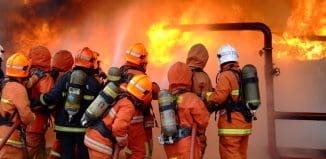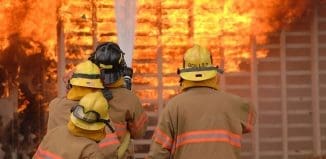Emergency Continuity in Israel – Special Report
This post is also available in:  עברית (Hebrew)
עברית (Hebrew)
The State of Israel is not ready provide total protection to the home front during emergencies and disasters * A new threat: EMP * 30 % of the population does not have proper shelter * the future – solid-state laser protection systems.

Israel must prepare for scenarios involving tens of thousands of missiles and rockets that will target its civilian home front, with every civil institution considered a legitimate target by the enemy: Airports, hospitals, kindergartens and artillery batteries. The home front must go through a real revolution but everything progresses slowly. “We did not do enough”. The proof: Civilian infrastructure was severely damaged during the Second Lebanon War and the Jerusalem snowstorm last winter.
This was the tone at Israel’s national disaster and emergency continuity conference, which took place yesterday at Airport City.
Maj. Gen. (Res.) Ya’akov Amidror, former head of the National Security Council: “Our enemies realized that it’s very hard to defeat Israel in classic wars over borders, with tanks and fighter jets. They realized that we have a major advantage when it comes to enlisting soldiers quickly and reaching the battlefield. And so our enemies concentrated on means of attack that will allow them to hurt civilians, using tens of thousands of rockets and missiles.” Amidror continued to describe how the system manages issues of home front continuity:
- The initiated attack circle. Capabilities that allow military authorities to damage launchers and missiles on enemy territory, using ground and air forces. “You can’t have a launcher launch twice.”
- Active defenses. Includes four layers: Arrow 2 and 3 for the upper layers, Magic Wand for the second, Iron Dome for the third – and in the future there will be a solid-state laser system for the final layer, covering the shortest possible range.
- Passive defenses. The nation’s ability to maintain daily routine while waging war. Providing services and keeping losses to a minimum.
Amir Hayek, President of the Manufacturers Association of Israel, complained that “in the United States there’s a special government office focusing on disaster preparedness, while here the Home Front Defense Ministry was shut down.” According to him there’s a lack of coordination between government, public organizations and local authorities as far as emergency preparedness is concerned. “Investors in Israeli companies are getting worried since the government marks the business sector as an enemy, in addition to not declaring emergency situations even when it’s necessary.”
iHLS – Israel Homeland Security
Ami Ayalon, former cabinet minister, Shin-Bet chief and Navy commander: “There’s nothing home-like about the home front, it’s another kind of war front just like the military front. In order to create readiness on the home front there have to be public discussions rather than secretive committee meetings. There have to be cooperation and coordination between government, industry, local authorities and various NGOs.”
Brig. Gen. Ze’ev Zuk-Ram, Deputy Chief of the National Security Council, announced that around 30% of the citizens in Israel lack shelters, especially around Haifa, the bay and Tel Aviv, and in those old houses live mostly senior citizens with no way of responding to emergencies.
Eli Glickman, CEO of Israel’s Electric Corporation: “The IEC is the most threatened entity in Israel in the cyber arena. There are around 10,000 attacks on company websites per hour, on average. So far there were no major incidents, but one successful infiltration can prove disastrous for our company and the entire nation.”
Glickman added a threat: Electromagnetic pulses generated by solar storms or nuclear detonations. “A high-intensity pulse can disable power production and distribution, in addition to distribution of fuel and water, transportation, emergency services, fire fighting and rescue, banking, financial services and more. Even planes would be unable to navigate safely. It’s an immense threat that can bring effectively paralyze an entire country at once.”
Partner CEO Haim Romano explained that Israel’s entire communications infrastructure is based on cellular technology, and cellular companies have to prepare for emergencies – maintain networks, information systems and cyber defenses. Romano called on the government to formally recognize the cellular infrastructure in Israel as a full national infrastructure system.






























